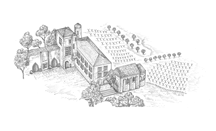 Origins of the cuvée
Origins of the cuvée  HOSPITALIERS DE BONPAS
HOSPITALIERS DE BONPAS
Each cuvée reveals a chapter in the history of this prestigious site or its region.
In the 12th century, the Knights Templar established a guardhouse at Bonpas in the Comtat Venaissin.
A Templar guardhouse was built in Visan, a highly strategic location for Pope John XXII.
 Grape varietals
Grape varietalsGrenache noir and Syrah
 Vinification and maturing
Vinification and maturingOnce de-stemmed, the grapes are vinified separately to extract the full potential of each variety. Fermentation takes place in stainless steel tanks at a controlled temperature of 24°C, with extractions such as délestages and remontages. The grape varieties are then blended and the wine aged in stainless steel vats to preserve the freshness of the aromas and the suppleness of the tannins.
 Tasting notes
Tasting notesColour: Brilliant garnet red.
Bouquet: Aromas of ripe red berries ranging from Morello cherry to strawberry coulis.
Palate: Clean, powerful attack, supported by a fine minerality and notes of cinnamon and white pepper on a long, complex finish.
 Food and wine pairing
Food and wine pairing
Serve between 13-15°C/56-59°F. This subtle, delicate wine goes well with roast quail with chestnuts, rack of veal à la provençale or roast pork with prunes.
 Appellation
AppellationThe appellation’s vineyards extend over 540 hectares around the charming village of Visan, in the enclave of the Popes in northern Vaucluse, between fields of lavender and truffle oaks. Gallo-Roman remains attest to a human presence as far back as Antiquity, and vines were already being grown here in the 3rd century. Once owned by the Knights Templar, Visan became papal land in 1344. Located in the temperate zone of the southern Rhône valley, the soil is composed of stony plateaus, rolled pebbles and limestone gravels over yellow marl.
In 1966, the vineyard was one of the first to be classified as a communal Côtes du Rhône Villages. The Grenache Noir grape expresses itself here with finesse, and benefits from a terroir that favours organic viticulture.